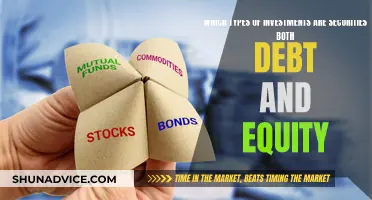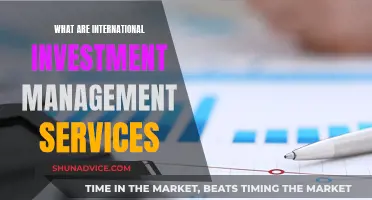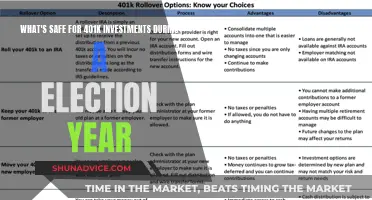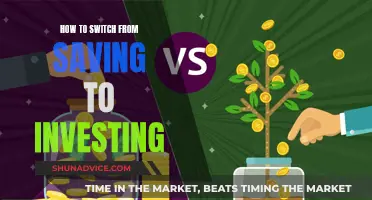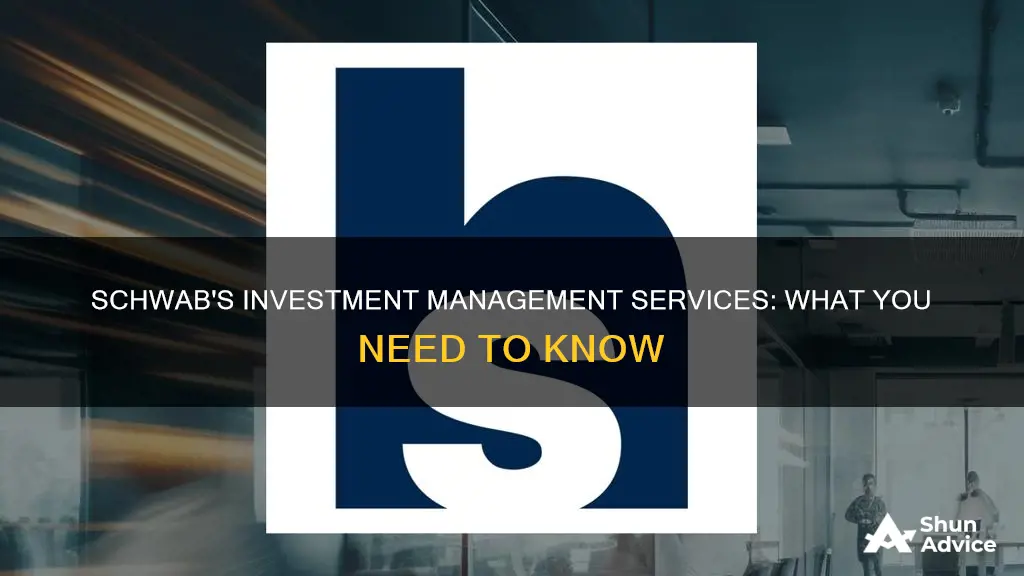
Charles Schwab Corporation is an American multinational financial services company that offers a wide range of investment products and services. With over 380 branches and $8.5 trillion in client assets as of 2023, Charles Schwab is one of the largest banks in the United States by assets. The company offers a comprehensive range of investment products, including various funds, bonds, fixed income products, exchange-traded funds (ETFs), mutual funds, and international stock trading. Charles Schwab also provides wealth management advisory services, consulting, and related services to both retail and institutional clients. The company has a history of pioneering discount sales of equity securities and providing 24/7 services to its clients.
| Characteristics | Values |
|---|---|
| Number of branches | 380+ |
| Branch locations | Primarily in financial centers in the US and the UK |
| Services offered | Banking, commercial banking, investing and related services including consulting, and wealth management advisory services |
| Clients | Retail and institutional |
| Client assets | $8.5 trillion |
| Active brokerage accounts | 34.8 million |
| Corporate retirement plan participants | 5.2 million |
| Banking accounts | 1.8 million |
| Donor advised fund | Available for clients seeking to donate securities |
| Number of funds | 100+ |
| Assets under management | $1 trillion+ |
| Products | ETFs, mutual funds, separately managed account strategies, money market funds, bonds and fixed income products, cryptocurrency, securities lending fully paid |
What You'll Learn

Charles Schwab's history and current status
Charles Schwab is an American multinational financial services company that offers banking, commercial banking, investing, and related services. It was founded in 1971 by Charles R. Schwab, who pioneered discount sales of equity securities.
In 1973, the company changed its name to Charles Schwab & Co., Inc. and, in 1975, it set up a stock brokerage, offering discount brokerage services. Schwab opened its first branch in Sacramento, California, in 1975 and, by 1978, the company had 45,000 client accounts. By 1981, it had become a member of the New York Stock Exchange and had its first international office in Hong Kong.
In 1983, the company was acquired by Bank of America for $55 million, but management, including Charles R. Schwab, bought the company back in 1987 for $280 million. In 1995, the company acquired The Hampton Company, and its founder, Walter W. Bettinger, became CEO of Schwab in 2008.
Over the years, Schwab has continued to expand and diversify its offerings, including launching online trading in 1996 and acquiring TD Ameritrade in 2020. As of December 31, 2023, the company had $8.5 trillion in client assets, 34.8 million active brokerage accounts, 5.2 million corporate retirement plan participants, and 1.8 million banking accounts.
Today, Charles Schwab is one of the largest banks in the United States by assets and offers a range of investment management services, including competitively priced ETFs, mutual funds, and separately managed account strategies.
Saving and Investing: Biblical Principles for Financial Wisdom
You may want to see also

Investment products offered
Charles Schwab offers a wide range of investment products to cater to the needs of both new and experienced investors. The investment products offered by Charles Schwab include:
Money Market Funds
Charles Schwab offers a wide range of money market funds designed to offer stability of capital, liquidity, and current income. These funds provide investors with access to capital markets and the potential for returns.
Bonds and Fixed Income Products
Charles Schwab provides comprehensive support and a wide selection of bonds and fixed-income products at low prices. This includes access to U.S. Treasury bonds and corporate bonds through the Schwab BondSource® platform, which allows investors to screen over 36,000 bonds.
Mutual Funds
Investors can access thousands of no-load, no-transaction-fee mutual funds at Charles Schwab. The company also offers a broad range of offshore mutual funds carefully screened by Schwab experts, providing international investment opportunities.
Exchange-Traded Funds (ETFs)
Charles Schwab is one of the nation's largest providers of ETFs, with over 2,000 ETFs available across a wide range of asset classes and fund companies. The company's ETF offerings are competitively priced and include the Schwab Mortgage-Backed Securities ETF. Investors can also utilize the Schwab Personalized Portfolio Builder tool to create a diversified ETF portfolio.
Stock Trading
Charles Schwab offers online stock trading on over 30 international stock exchanges across multiple countries. The company provides tools and research informed by Schwab experts, as well as real-time trade analysis. Investors can also access advanced platforms and tools for trading specific stock types, such as American Depositary Receipts (ADRs) and Foreign Ordinaries.
Options Trading
Charles Schwab offers sophisticated options trading tools, education, and specialized support at competitive prices. Investors can trade options online with low fees and access platforms specifically designed for options traders.
Futures and Forex Trading
Investors can access futures and futures options, allowing them to trade during nearly any time of the day during the trading week. Additionally, Charles Schwab provides access to the global currency market through forex trading, enabling investors to speculate and hedge on currency movements nearly 23 hours a day, six days a week.
Cryptocurrency Investing
While Charles Schwab does not currently offer spot trading of cryptocurrency, it provides several choices for investors interested in gaining exposure to cryptocurrency markets.
Strategies to Overcome Investment Portfolio Challenges
You may want to see also

Pricing and performance
Charles Schwab Investment Management (CSIM) offers a range of competitively priced investment products, including exchange-traded funds (ETFs), mutual funds, and separately managed account strategies. The company aims to give all investors access to low costs, typically reserved for large institutions and wealthy individuals, by providing a simplified pricing structure.
With over 100 funds and more than $1 trillion in assets under management, Schwab offers a comprehensive range of investment products, such as money market funds, bonds and fixed-income products, and international equities.
Schwab's ETFs have no online commissions when trading online, with over 2,000 listed ETFs across various asset classes and fund companies. The company also provides access to thousands of no-load, no-transaction-fee mutual funds.
In addition, Schwab offers sophisticated options tools, education, and specialised support at a great price. The company provides access to additional markets almost any time during the trading week through futures and futures options.
Schwab also provides access to the global currency market nearly 24/6 through forex trading and several choices for gaining exposure to cryptocurrency markets, although spot trading of cryptocurrency is not currently available.
Building a Robust Investment Portfolio: Where to Start?
You may want to see also

Cryptocurrency investing
Charles Schwab does provide investment management services, and cryptocurrency investing is one of the services it offers.
Cryptocurrency is a virtual currency secured through one-way cryptography. It is decentralised, meaning it allows for direct peer-to-peer exchange of value without the need for a central third-party intermediary like a bank. Cryptocurrency appears on a distributed ledger called a blockchain, which is transparent and shared among all users in a permanent and verifiable way.
Ways to Invest in Cryptocurrency at Schwab
Charles Schwab offers several choices for gaining exposure to the cryptocurrency market, although spot trading of cryptocurrency is not currently available. Here are some of the options:
- Cryptocurrency-related ETFs and Mutual Funds: These provide exposure to spot cryptocurrency, cryptocurrency futures contracts, and companies focused on servicing the cryptocurrency market. The Schwab Crypto Thematic ETF, for example, offers global exposure to companies that may benefit from the development or utilisation of cryptocurrencies and blockchain technology.
- Cryptocurrency Coin Trusts: These products allow investors to trade shares in trusts holding large pools of a cryptocurrency. Examples include the Grayscale Bitcoin Cash Trust and the Bitwise 10 Crypto Index Fund. However, these can trade at a premium/discount to net asset value (NAV) and involve high volatility, fees, and other risks.
- Cryptocurrency Futures: Clients with a futures account can trade cryptocurrency futures contracts directly. These contracts are settled in cash, not cryptocurrency.
- Cryptocurrency Stocks: Some stocks provide indirect exposure to cryptocurrency due to the company's relationship to digital assets.
Considerations for Investing in Cryptocurrency
When considering investing in cryptocurrency, it is important to keep in mind the risks and volatility associated with this asset class. Here are some key considerations:
- Volatility and Financial Loss: Cryptocurrency prices have historically been highly volatile, and fluctuations can result in significant financial losses.
- Unregulated Spot Markets: Spot markets for cryptocurrencies are relatively new and largely unregulated, exposing them to a higher risk of fraud and security breaches.
- Lack of Recoverability: Losing your login credentials or access to your cryptocurrency storage can result in the permanent loss of your cryptocurrency assets.
- High Expenses: Cryptocurrency trusts and mutual funds can come with high fees, sometimes exceeding 2% or more of the investment.
- Leverage Risk for Futures: Cryptocurrency futures are leveraged products, which means potential losses can exceed your initial investment.
- Tax Implications: The IRS treats cryptocurrency as property, not currency, and considers transactions in cryptocurrency spot markets as taxable events. Investors are responsible for tracking cost basis, gains, and reporting requirements.
- Regulatory and Consumer Protection: Cryptocurrency markets currently have minimal consumer protections and regulatory infrastructure.
Schwab's Perspective on Cryptocurrency Investing
Charles Schwab suggests that clients approach cryptocurrency as a speculative investment and consider their goals and the risks involved. Cryptocurrency investing may be suitable for trading purposes outside of a traditional, well-diversified portfolio.
How Interest Rates Affect Savings and Investments
You may want to see also

The company's acquisition history
The Charles Schwab Corporation has a long history of acquisitions, dating back to its early years. Here is a detailed overview of the company's notable acquisitions:
1971: The company was founded as Charles Schwab & Co. in 1971 by Charles R. Schwab. In the same year, Schwab and his partners incorporated the firm as First Commander Corporation, a subsidiary of Commander Industries, Inc. They offered traditional brokerage services and published the Schwab investment newsletter.
1972-1973: Schwab continued to grow his business by buying all the stock from Commander Industries, Inc. in 1972, and the corporate name was changed to Charles Schwab & Co., Inc. in 1973.
1983: In 1983, Bank of America acquired Charles Schwab & Co. for $55 million. However, this acquisition was short-lived as management, including Charles R. Schwab, bought back the company in 1987 for $280 million.
1991: The company acquired Mayer & Schweitzer, a market-making firm, allowing Schwab to execute customer orders without using an exchange.
1995: Schwab acquired The Hampton Company, founded by Walter W. Bettinger, who later became CEO of Schwab in 2008. This acquisition marked the beginning of Schwab's expansion into online investing and digital services.
1998: Schwab expanded its presence in Canada by acquiring two Canadian brokerages, creating Charles Schwab Canada.
2000: Schwab made a significant acquisition by purchasing U.S. Trust for $2.73 billion. However, in 2006, they announced the sale of U.S. Trust to Bank of America for $3.3 billion.
2001: Schwab continued its expansion by acquiring CyberCorp Inc., enhancing its online trading capabilities and improving its software and tools for active traders.
2004: Schwab acquired SoundView Technology Group for $345 million to bolster its equity research capabilities.
2006: The company acquired The 401(k) Company, a retirement plan provider, further diversifying its business.
2011: Schwab continued its growth with the acquisition of OptionsXpress Holdings, Inc., enhancing its online trading platform.
2012: Schwab acquired ThomasPartners, an asset management firm, to strengthen its investment management capabilities.
2020: Schwab made several strategic acquisitions, including Wasmer, Schroeder & Company, an independent investment manager, and TD Ameritrade, expanding its presence in the industry.
These acquisitions have played a crucial role in the growth and diversification of The Charles Schwab Corporation, allowing it to become one of the largest financial services companies in the United States.
Where to Find National Savings and Investments
You may want to see also
Frequently asked questions
Yes, Schwab provides investment management services. As one of the industry's largest and most experienced asset managers, they offer competitively priced ETFs, mutual funds, and separately managed account strategies designed to serve the central needs of most investors.
Schwab believes in giving all investors access to low costs, usually reserved for large institutions and wealthy individuals. They provide a simplified pricing structure and use their scale and efficiency to drive down costs.
Schwab offers a wide range of investment products, including:
- Money market funds
- Bonds and fixed-income products
- Mutual funds
- Exchange-traded funds (ETFs)
- Stock trading
- Options trading
- Futures and forex trading
- Cryptocurrency investing


